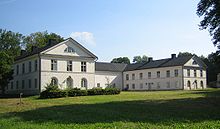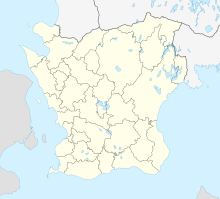Herrevad Abbey
| Herrevad Abbey | |
|---|---|
| Herrevadskloster | |
| Klippan Municipality | |

Herrevad Abbey
|
|
| Coordinates | 56°05′17″N 13°13′56″E / 56.0881°N 13.2322°E |
| Type | Castle |
| Site information | |
| Open to the public |
Yes |
| Site history | |
| Built | 1144 |
Herrevad Abbey (Swedish: Herrevadskloster, Danish: Herrevads Kloster) was a Cistercian monastery near Ljungbyhed in Klippan Municipality, Scania, in the south of present-day Sweden, but formerly in Denmark until 1658. It is now a country house known as Herrevad Castle (Swedish: Herrevads slott, Danish: Herrevads Slot).
Herrevad Abbey was founded from Cîteaux Abbey in 1144 as Denmark's first Cistercian monastery with the support of Archbishop Eskil of Lund. Legend has it that Eskil fell ill while he was a student at Hildesheim University in Germany and was told he was near death. The Virgin Mary appeared to him in a dream and he promised her that if he was spared he would establish five monasteries from different orders. Eskil went on to become the provost of the chapter at Lund Cathedral, the Bishop of Roskilde, and succeeded his uncle, Asser Svendsen, as Archbishop of Lund, and from these important offices was able to fulfil his promise.
Some Danish Benedictine monasteries had become unruly during his tenure, and the Cistercians were seen as reformers who would bring existing religious houses back to the original rigour of the Rule of St. Benedict. The original name, Herivad, meant the "army ford", referring to a ford over the Rønne River. After the construction of the abbey it became known as Herrevad, or "the Lord's ford", most likely because of the fee payable to the abbey for using the ford, and later the bridge, for commerce.
...
Wikipedia

